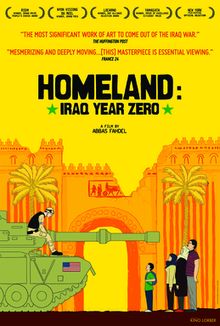
ANGELINA DOHRE
Staff Writer
In February 2002, just one year before the U.S. invaded Iraq, filmmaker Abbas Fahdel departed from France to return to his home in Iraq. There, he filmed everyday life as his country was preparing for war. This past week on April 4 and 5, Fahdel arrived at Fredonia and presented his two-part documentary, “Homeland: Iraq Year Zero.”
Part one of the film was screened on Tuesday and part two was shown on Wednesday. The first part focused on life before the war while the second showed the aftermath and damages Operation Iraqi Freedom had on Iraq.
A discussion session was held afterward where students and community members had the chance to ask Fahdel questions. Students who missed the two-part event can also find the documentary on Netflix.
In charge of the two-day event was associate professor of English Iclal Vanwesenbeeck. The program was made possible after it received funds from the Mary Louise White and Carnahan Jackson Foundations.
Vanwesenbeeck found out about Fahdel and his film through a Middle Eastern studies group she worked with at Harvard University.
“They invited [Fahdel], and when I saw it, I emailed my colleague,” she said. “I said, ‘This looks like the kind of film that I would like to see.’”
Two weeks after the war began in 2003, Fahdel returned to Iraq once again, but this time things were much different. Going to the grocery store, heading to school and other simple, everyday activities became nearly impossible.
“During the last trip of Fahdel’s, he loses someone in his family which makes him stop the project entirely, only to come back to it after 10 years,” Vanwesenbeeck said. “The second part, after the fall, is a little bit darker and of course shows the destruction, but also shows the brutality of war.”
Most of the action throughout both parts of the documentary was depicted through the eyes of Fahdel’s 12-year-old nephew, Haider. As the film progressed to part two, Haider took the role of representing the people of Iraq in various ways.
Fahdel presented a primary focus throughout both parts: his family. During part one, the film focused on his family and friends as they lived out their lives and went about their business. The second part displayed a darker side and showed the hardships Fahdel’s family dealt with as the war carried on.
“It is really his desire to preserve his family, memories, and archive them and maybe create a safe vault for his homeland,” Vanwesenbeeck. “But also, I think he wants this film to contribute to peace-making of some kind.”
Although he had an American visa, Fahdel could not travel to Fredonia earlier in the semester because Iraq was included on President Donald Trump’s travel ban list.
“Yet despite all this, he had crossed the Atlantic to stay in Fredonia only for five days to show his film,” Vanwesenbeeck said. “He [Fahdel] told me he had so many screenings around the world, especially in the U.S., but here he felt like he was amongst his family.”
The title, “Homeland: Iraq Year Zero,” was based on Roberto Rossellini’s 1948 film “Germany Year Zero,” that depicted life in Germany during World War II. This film was also mostly depicted through the eyes of a child.
This is Fahdel’s seventh film. He creates both documentaries and feature films.
“Most of his films are award-winning films, but this one is particularly important because it is hailed as one of the best documentaries of the Iraq War,” Vanwesenbeeck said.
Sophomore communication major Kate Sepulveda said she learned a lot about the way people lived in Iraq compared to the average American’s lifestyle.
“It was really cool to see the up-close and personal everyday life of people instead of having to read about it off the internet,” she said.
Sepulveda also mentioned that some of what the Iraqi people experienced was shocking.
“My favorite part was when siblings were washing a rug and having so much fun just playing with the water,” she said. “It was something so simple yet so eye-opening.”
